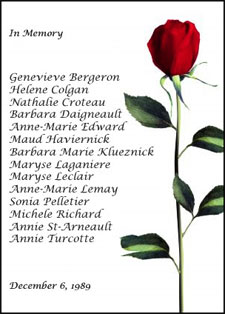This is an archive of news stories and research from the National Union of Public and General Employees. Please see our new site - https://nupge.ca - for the most current information.
More than 20 years after the tragic events in Montreal, violence against women continues to be a serious issue in Canada.
 Ottawa (4 Dec. 2011) – On Dec. 6, 1989, a gunman entered L’Ecole Polytechnique in Montreal, segregating the female students from the male students and began firing at the female engineering students.
Ottawa (4 Dec. 2011) – On Dec. 6, 1989, a gunman entered L’Ecole Polytechnique in Montreal, segregating the female students from the male students and began firing at the female engineering students.
On that day, 14 young women lost their lives to violence. The event has become known as the Montreal Massacre and is symbolic of the fight to end violence against women. In 1991, Canada’s Parliament declared December 6 a National Day of Mourning and the National Day to End Violence Against Women.
The facts:
Violence against women and girls continues to be a serious issue in Canada:
- In 2008, 146 female were murdered in Canada. Forty-five of these women were victims of spousal homicide. On average, 178 females were killed every year between 1994 and 2008;
- It is estimated that 60% of Canadian women and girls have suffered from physical or psychological violence at some time in their life;
- Between April 1, 2007 and March 31, 2008, approximately 101,000 women and children were admitted to 569 shelters in Canada;
- According to the 2004 General Social Survey, Aboriginal women 15 years and older are three and a half times more likely to experience violence than non-Aboriginal women. The Native Women’s Association of Canada has documented evidence that 582 Aboriginal women and girls have gone missing or have been murdered in Canada in the past few decades; and
- Annual costs of intimate partner violence is calculated at US$1.16 billion in Canada according to UNIFEM in its report The Facts: Violence Against Women & Millennium Development Goals.
Prevention and Protection
Violence against women has many forms including physical, sexual, emotional and financial. In order to eradicate violence, measures need to be put in place to address prevention of violence against women, protection for victims of violence and public policy and services that support victims.
The prevention of violence against women and girls is multi-faceted and includes ensuring that education begins with the young. Young men must be taught that violence is unacceptable. Young women must be provided with education and awareness as younger women are the most vulnerable to the risk of domestic violence. Men have a critical role in ending violence against women and girls by challenging and eliminating the attitudes, norms and practices that perpetuate men’s control and power over women and reinforce tolerance for violence against women and girls.
The protection of victims of violence is vital. Stable and sufficient funding to transition homes and women’s emergency shelters must be provided. There also needs to be access to free or low-cost family law legal aid.
Public policies and services such as adequate and affordable housing must be available to enable victims of violence to build a life for themselves and their children. To ensure a stable financial future, women escaping violence need a guaranteed liveable income and wage parity with men. In order to ensure employment, an universal publicly funded early education and child care program should be available.
Public services such as health care, social services and education need to be expanded not restricted - which has been the current trend of governments as they balance their budgets.
"On December 6, we must pause to remember the women that have been lost to violence. We must also force our governments to take steps to prevent violence and to support victims of violence,” states James Clancy, National President of the National Union of Public and General Employees (NUPGE).
NUPGE
The National Union of Public and General Employees (NUPGE) is one of Canada's largest labour organizations with over 340,000 members. Our mission is to improve the lives of working families and to build a stronger Canada by ensuring our common wealth is used for the common good. NUPGE
